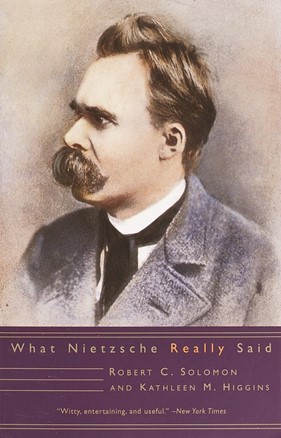Description
What Nietzsche Really Said gives us a lucid overview -- both informative and entertaining -- of perhaps the most widely read and least understood philosopher in history.
Friedrich Nietzsche's aggressive independence, flamboyance, sarcasm, and celebration of strength have struck responsive chords in contemporary culture. More people than ever are reading and discussing his writings. But Nietzsche's ideas are often overshadowed by the myths and rumors that surround his sex life, his politics, and his sanity. In this lively and comprehensive analysis, Nietzsche scholars Robert C. Solomon and Kathleen M. Higgins get to the heart of Nietzsche's philosophy, from his ideas on "the will to power" to his attack on religion and morality and his infamous Übermensch (superman).
What Nietzsche Really Said offers both guidelines and insights for reading and understanding this controversial thinker. Written with sophistication and wit, this book provides an excellent summary of the life and work of one of history's most provocative philosophers.
About the Author
Robert C. Solomon (September 14, 1942 – January 2, 2007) was a professor of continental philosophy at the University of Texas at Austin.Early lifeSolomon was born in Detroit, Michigan. His father was a lawyer, and his mother an artist. After earning a B.A. (1963) at the University of Pennsylvania, he moved to the University of Michigan to study medicine, switching to philosophy for an M.A. (1965) and Ph.D. (1967).He held several teaching positions at such schools as Princeton University, the University of California, Los Angeles, and the University of Pittsburgh. From 1972 until his death, except for two years at the University of California at Riverside in the mid-1980s, he taught at University of Texas at Austin, serving as Quincy Lee Centennial Professor of Philosophy and Business. He was a member of the University of Texas Academy of Distinguished Teachers. Solomon was also a member of the inaugural class of Academic Advisors at the Business Roundtable Institute for Corporate Ethics.His interests were in 19th-century German philosophy--especially Hegel and Nietzsche--and 20th-century Continental philosophy--especially Sartre and phenomenology, as well as ethics and the philosophy of emotions. Solomon published more than 40 books on philosophy, and was also a published songwriter. He made a cameo appearance in Richard Linklater's filmWaking Life(2001), where he discussed the continuing relevance of existentialism in a postmodern world. He developed a cognitivist theory of the emotions, according to which emotions, like beliefs, were susceptible to rational appraisal and revision. Solomon was particularly interested in the idea of "love," arguing against the notion that romantic love is an inherent state of being, and maintaining, instead, that it is instead a construct of Western culture, popularized and propagated in such a way that it has achieved the status of a universal in the eyes of many. Love for Solomon is not a universal, static quality, but an emotion, subject to the same vicissitudes as other emotions like anger or sadness.Solomon received numerous teaching awards at the University of Texas at Austin, and was a frequent lecturer in the highly regarded Plan II Honors Program. Solomon was known for his lectures on Nietzsche and other Existentialist philosophers. Solomon described in one lecture a very personal experience he had while a medical student at the University of Michigan. He recounted how he stumbled as if by chance into a crowded lecture hall. He was rather unhappy in his medical studies at the time, and was perhaps seeking something different that day. He got precisely that. The professor, Frithjof Bergmann, was lecturing that day on something that Solomon had not yet been acquainted with. The professor spoke of how Nietzsche's idea asks the fundamental question: "If given the opportunity to live your life over and over again ad infinitum, forced to go through all of the pain and the grief of existence, would you be overcome with despair? Or would you fall to your knees in gratitude?"Solomon died on January 2, 2007 at Zurich airport. His wife, philosopher Kathleen Higgins, with whom he co-authored several of his books, is Professor of Philosophy at University of Texas at Austin.
